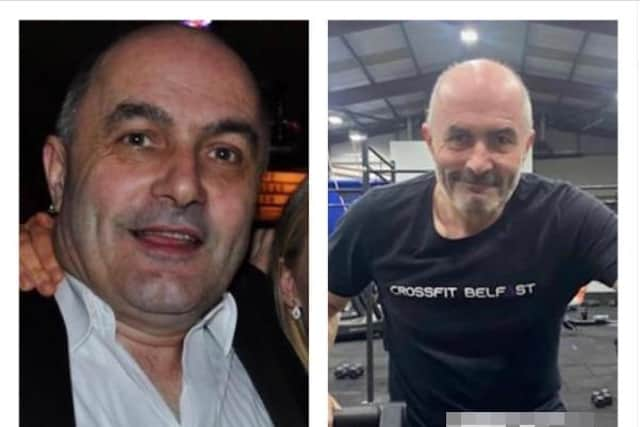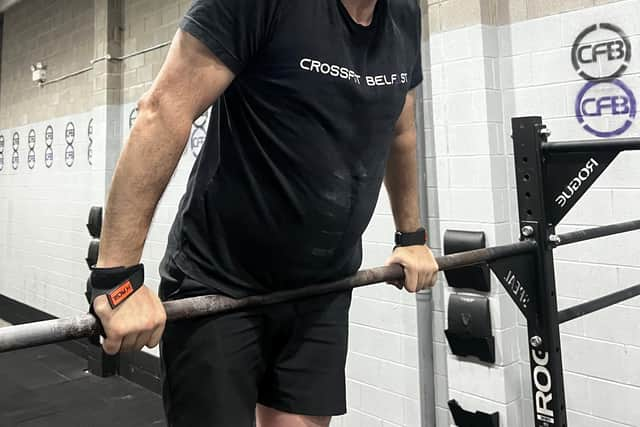The NI man fighting Parkinson’s through fitness


Scott Hanley, a self-employed financial services consultant, was diagnosed with the progressive neurological condition six years ago.
The father of two grown-up daughters said he first noticed something wasn’t right when he was resting in the evenings.
Advertisement
Hide AdAdvertisement
Hide Ad"When I would sit down after my dinner my fingers and hand would twitch and spasm."


The former army officer, who is married to Cathy, had always kept fit and healthy, and initially assumed it was referred tingling from a prolapsed disc.
“But a month or two later I took the dog for a walk round the block and as I turned a corner my foot just stuck – it felt like I was wearing a metal boot and it was stuck to a magnet. At that point I realised there was something going on."
Scott saw his GP who referred him to a neurologist at the Royal Victoria Hospital.
Advertisement
Hide AdAdvertisement
Hide Ad“After a number of tests, the neurologist said I wasn’t presenting massively with Parkinson’s symptoms, but decided to put me through a DaTscan, (a nuclear medicine test that helps to distinguish Parkinson’s disease from other causes of tremor or difficulties with movement).”
A few months later Scott received a positive confirmation of Parkinson’s.
“I got my results a week before Christmas. I was kind of expecting it. I was not shocked because my hand twitches were getting worse. I was definitely a bit scared, but it was not the prevailing emotion.
"I then saw a neurologist who told me it had been caught early. The protocol was that I would be reviewed every six months.”
Advertisement
Hide AdAdvertisement
Hide AdParkinson’s symptoms start to appear when the brain can’t make enough dopamine to control movement properly.
There are over 40 symptoms, but the three main ones are a tremor (shaking), slowness of movement and rigidity (muscle stiffness).
“I was getting really bad leg cramps at night and really, really horrendous dreams, which were terrifying.
"I had ‘sticky’ feet, but thankfully that wasn’t persistent. However, once I was going through the security queue for a flight to London and my feet just stuck and I collapsed.
Advertisement
Hide AdAdvertisement
Hide Ad“Another time I got out of the car, my foot just stuck and I fell on the road. Thankfully, it was in a break in the traffic.”
Scott continued to see his consultant every six months, but over the years his symptoms got progressively worse.
"I went through a period before the first lockdown where my cognition was really deteriorating. I was hallucinating and had total brain fog.
“The hand movement became a bit more frequent, my legs had a mind of their own and the cramps were really unpleasant. It was really impacting my life.” At this stage Scott made a very concerted decision to address his Parkinson’s symptoms.
Advertisement
Hide AdAdvertisement
Hide Ad“One of the bits of advice I got was to learn something new for your brain, like learn to play the piano; and secondly be fit and strong.”
By happy coincidence a friend had asked if he would help coach the U18s Instonians Rugby squad.
“That starting getting me moving a bit and I’m now in my sixth season. I would be an active person, but I had let myself go a bit."
During the first lockdown he did exercises in his garden, started time-restricted eating and removed all the bad carbs and sugar from his diet.
"I started doing cognitively-intense exercise.
Advertisement
Hide AdAdvertisement
Hide Ad"I stuck my phone to the wall of the garage and followed different apps and YouTube videos.
"I was moving hard, but I was also thinking – I was listening to instructions.
“Between the exercise and the nutrition, the weight was starting to drop off and more importantly my symptoms were starting to reduce.”
Then in April 2020 he joined CrossFit Belfast, not telling anyone about the Parkinson’s.
Advertisement
Hide AdAdvertisement
Hide Ad"I walked in and looked at the whiteboard and it had all these letters and acronyms and I thought it might as well have been written in Arabic – I couldn’t understand it, let alone was able to do it. So I thought, brilliant, my brain’s hurting before my body’s hurting.”
Convinced that CrossFit was keeping his symptoms at bay, Scott stuck to his five-day a week training regime.
"Month on month I kept at it. I enjoyed it and I enjoyed the community and literally my Parkinson’s symptoms starting vanishing.”
By sharing his story Scott said he wants people to know how effective his approach has been.
Advertisement
Hide AdAdvertisement
Hide Ad“The Parkinson’s hasn’t gone away, but by October 2021 I declared personally to myself that I was symptom-free, which was quite mind-blowing.”
Tim Morton, physical activity programme manager for Parkinson’s UK, agreed that being active is so important for people with Parkinson’s as it can help to manage symptoms, maintain health and lift your mood.
“It can make you feel good inside and out. The more physically active you are, the easier it is to live well with Parkinson’s.
"Our website has various guides and advice about physical activity, depending on how your symptoms are progressing, which you can access at www.parkinsons.org.uk/information-and-support/exercise."